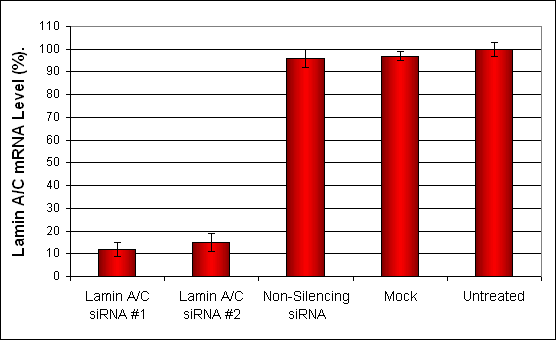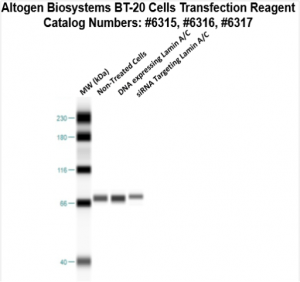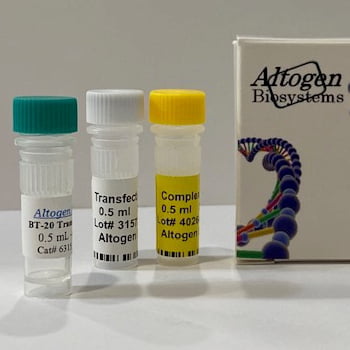Description
Purchase Orders: Click “Add to Cart” button to order, then email PO to orders@altogen.com.
Product Availability: In Stock.
Transfection Reagent for BT-20 Cells (Breast Carcinoma Cells, HTB-19)
-
Two component formulation enhances lipid mediated transfection efficiency
-
Optimized easy-to-use transfection protocol provided for transfection of siRNA, DNA, mRNA, and microRNA
-
Kit includes Transfection Enhancer reagent and recommended transfection protocol
-
High transfection efficacy in the presence of serum
-
Expand your RNAi application with a reagent optimized for delivery of both siRNA and plasmid
-
Reproducible transfection results
-
Works well for standard reverse transfection and high-throughput applications
-
Download in vitro BT-20 transfection protocol: [PDF]
- Download BT-20 CRISPR/Cas9 transfection protocol: [PDF]
-
Download PowerPoint presentation for BT-20 cells transfection kit: [PPT]
- UPC/GTIN/EAN: 860002089733
-
Brand: ALTOGEN®, developed and manufactured by Altogen Biosystems
Reagent exhibits at least 85% transfection efficiency of siRNA delivery. Transfection efficiency was determined by qRT-PCR.
Transfection Protocol and MSDS:
Download Altogen Biosystems Transfection Protocol: [PDF]
Download MSDS: [PDF]
BT-20 Cell Line:
Breast cancer represents the most prevalent type of cancer among women worldwide, making it a significant public health concern. Despite major improvements in breast cancer management, preclinical breast cancer research plays an essential role in the development of novel treatments. Triple Negative Breast Cancer (TNBC) cell lines are one of the most valuable tools of research during preclinical studies. Unlike, standard breast cancer cells, TNBC cells lack the expression of estrogen and progesterone receptors. Also, these cells do not exhibit amplification of HER2, a type of Epidermal Growth Factor Receptors (EGFR), which makes TNBC cells non-receptive to many forms of treatment that hormone-positive cells respond well. However, it makes TNBC cell lines a powerful research tool for new types of gene therapy. The BT-20 cell line was established from a primary human breast cancer tumor in 1958 by isolation and culturing of cells and has proven to be a successful host for a variety of transfection studies. These cells came from a 74-year-old Caucasian female patient with breast carcinoma and were obtained by E.Y. Lasfargues and L. Ozzello. Growth factors are often used when studying these cells that do not possess estrogen receptors but do express an estrogen receptor mRNA that has a deletion of exon 5. Altogen Biosystems provides two-component lipid-based transfection reagent kits for the BT-20 breast cancer cell line, which have shown high transfection efficacy verified by qRT-PCR. The BT-20 transfection kit is particularly helpful in the field of biomedical therapeutics as well as in gene expression studies.
BT-20 is a cell line that was derived from the breast tumor of a patient with invasive ductal carcinoma. It is commonly used as a model system for studying breast cancer and for developing and testing new cancer therapies. BT-20 cells are adherent and grow in vitro as monolayer cultures. They have an epithelial-like morphology and are estrogen receptor-negative and progesterone receptor-negative, but express high levels of HER2/neu, a receptor tyrosine kinase that is commonly overexpressed in breast cancer. BT-20 cells are often used to investigate the molecular mechanisms of breast cancer progression and to test the efficacy of various drugs and compounds for the treatment of breast cancer. BT-20 cells are particularly useful for studying the effects of targeted therapies that inhibit HER2/neu signaling, such as trastuzumab and lapatinib. They have also been used to investigate the role of other signaling pathways, such as the PI3K/Akt/mTOR pathway, in breast cancer progression and drug resistance.
Mutations:
| PIK3CA | 5290 | 37 | 3 | 178952085 | 178952085 | Missense_Mutation | SNP | A | G |
| TP53 | 7157 | 37 | 17 | 7578536 | 7578536 | Missense_Mutation | SNP | T | G |
| CACNA1E | 777 | 37 | 1 | 181453006 | 181453006 | Silent | SNP | G | T |
| MED12L | 116931 | 37 | 3 | 151073819 | 151073819 | Missense_Mutation | SNP | G | A |
| ZEB2 | 9839 | 37 | 2 | 145147383 | 145147383 | Missense_Mutation | SNP | C | T |
| PIK3CA | 5290 | 37 | 3 | 178936074 | 178936074 | Missense_Mutation | SNP | C | G |
| LRP1B | 53353 | 37 | 2 | 141609267 | 141609267 | Silent | SNP | C | T |
| NRROS | 375387 | 37 | 3 | 196388349 | 196388349 | Missense_Mutation | SNP | C | T |
| CCDC180 | 1E+08 | 37 | 9 | 100070026 | 100070026 | Missense_Mutation | SNP | C | T |
| ARMC4 | 55130 | 37 | 10 | 28273157 | 28273157 | Missense_Mutation | SNP | C | G |
| CBLN4 | 140689 | 37 | 20 | 54578975 | 54578975 | Missense_Mutation | SNP | C | T |
Data:

Figure 1. siRNAs targeting Lamin A/C mRNA or non-silencing control siRNA were transfected into BT20 cells following the recommended protocol. At 48 hours post-transfection the cells were analyzed by qRT-PCR for Lamin A/C gene expression levels. 18S rRNA levels were used to normalize the Lamin A/C data. Values are normalized to untreated sample. Data are means ± SD (n=4).

Figure 2. Protein expression of Lamin A/C in BT-20 cells. DNA plasmid expressing Lamin A/C or siRNA targeting Lamin A/C were transfected into BT-20 cells following Altogen Biosystems transfection protocol. At 72 hours post-transfection the cells were analyzed by Western Blot for protein expression levels (normalized by total protein, 10 µg of total protein loaded per each well). Untreated cells used as a negative control.
Altogen Biosystems:
Altogen Biosystems provides preoptimized transfection products for life science research applications. Transfection protocols are optimized for individual cancer cell lines. Altogen Biosystems developed two types of in vivo delivery kits for animal research: Tissue-targeted reagents (delivery to liver, pancreas, and kidney tissues), and broad range in vivo delivery reagents (PEG-Liposome, Nanoparticle-based, Lipid-based, and Polymer-based kits). Advanced formulation of reagents and optimized transfection protocols provide efficient intracellular delivery of proteins, DNA, RNA, and any other negatively charged molecules in vitro and in vivo. Read more about transfection technology at Altogen’s Transfection Resource.
Altogen Labs Research Services:
Altogen Labs provides GLP-compliant contract research studies for pre-clinical research, IND applications, and drug development. Biology CRO services include: Xenograft models (90+), development of stable cell lines, ELISA assay development, cell-based and tissue targeted RNAi studies, safety pharm/tox assays, and other studies (visit AltogenLabs.com).
Volume Options:
- 0.5 ml (Catalog #6315)
- 1.5 ml (Catalog #6316)
- 1.5 ml CRISPR (Catalog #2118)
- 8.0 ml (Catalog #6317)
Purchase Orders: Click “Add to Cart” button to order, then email PO to orders@altogen.com.
Product Availability: In Stock.





